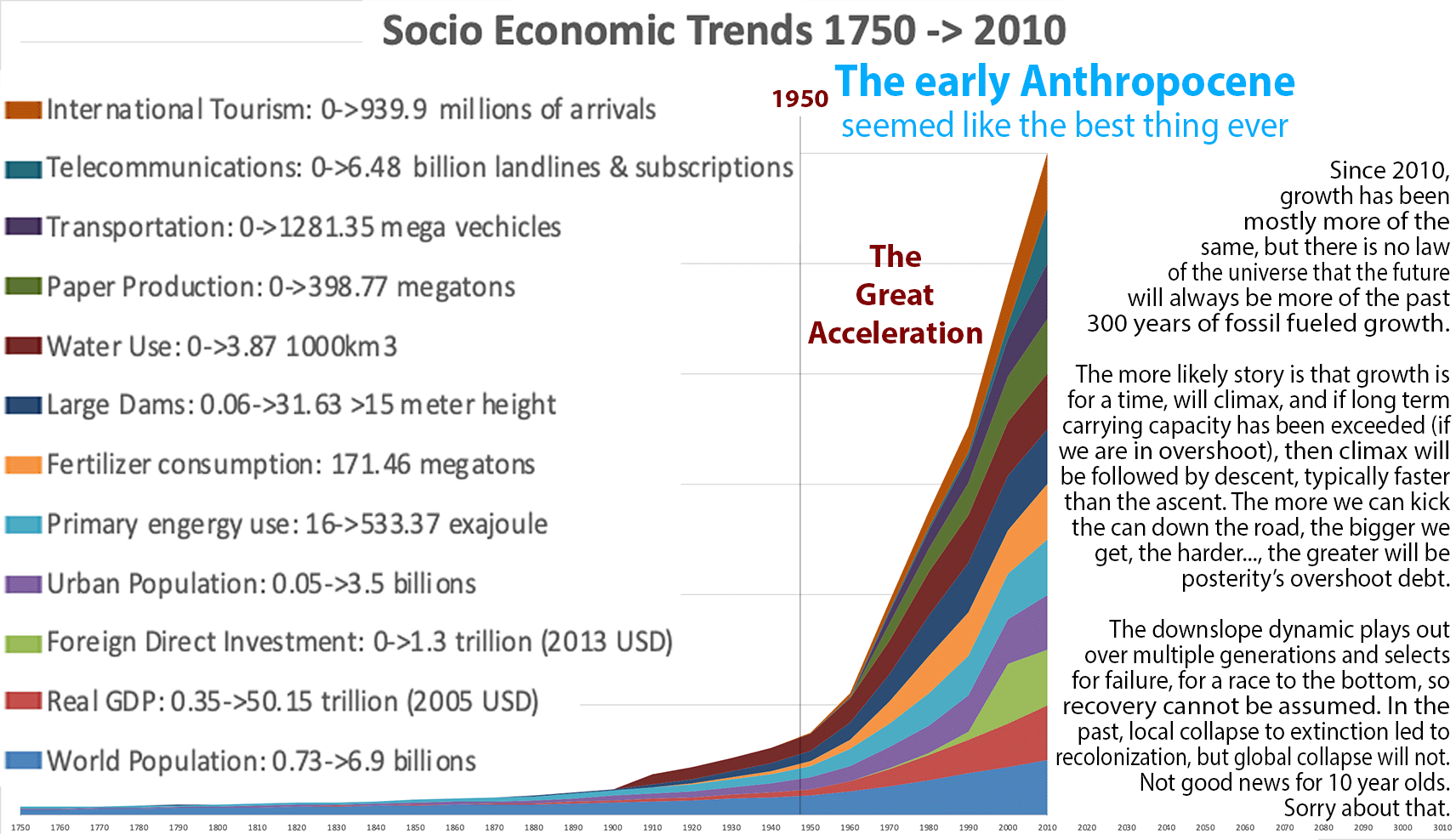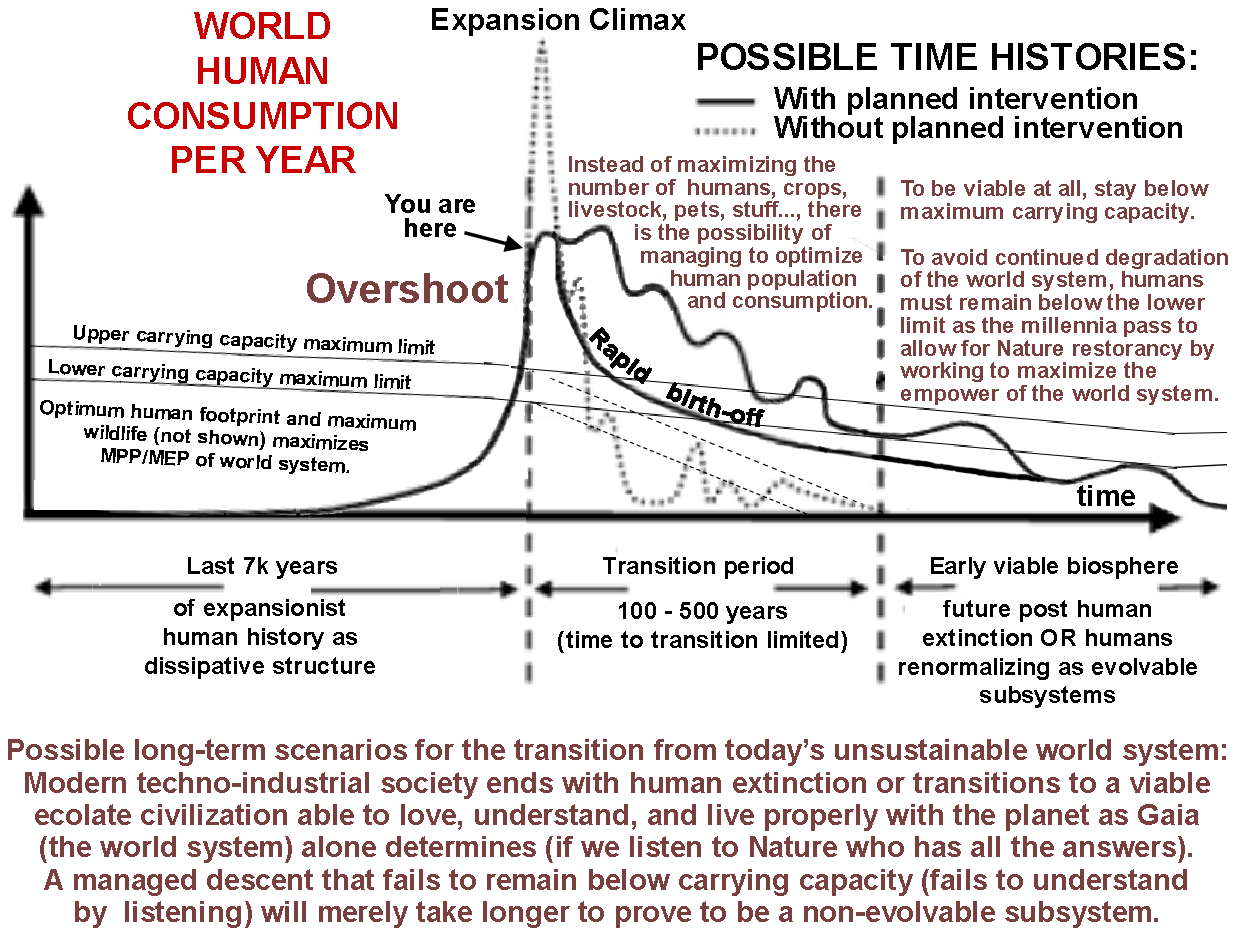
WEDNESDAY, AUGUST 3, 2022: NOTE TO FILE

The Great Selection
Many will enter, few emerge
Eric Lee, A-SOCIATED PRESS
TOPICS: NOT NEARLY SMART ENOUGH, FROM THE WIRES, FORESIGHT ENOUGH
Abstract: We humans have been dissapating away for millennia. We of today live in interesting times. What we do (or don't do) could matter.
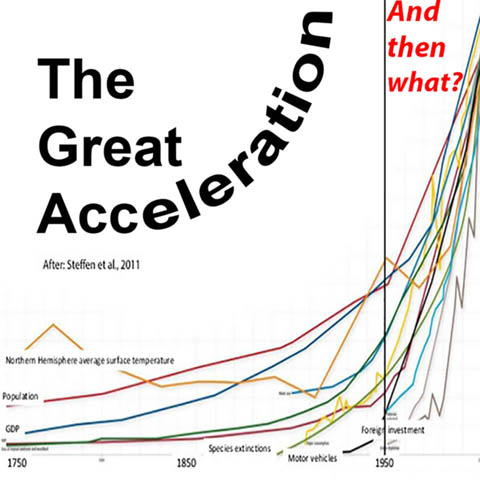 COOS BAY (A-P) — Nate Hagens gazes into the future (dimly as such is the best we humans can hope to do) and sees a 'Great Simplification'. Looking back with some clarity is possible, and those paying attention look back to circa 1950 and see a Great Acceleration. Some who were paying attention (e.g. H.T. Odum, H.G. Wells, M. King Hubbert, William Vogt) before 1950 foresaw what was coming and asked, 'And then what?' Such is 'foresight intelligence', an ability that modern techno-industrial society selects against apart from serving military or business interests. Foresight based on asking 'And then what?' (Garrett Hardin's 'ecolacy'), is otherwise selected against as it tends to limit our Anthropocene enthusiasm for pursuing short-term self interests that define our (now global) monetary culture (aka modern techno-industrial form of civilization).
COOS BAY (A-P) — Nate Hagens gazes into the future (dimly as such is the best we humans can hope to do) and sees a 'Great Simplification'. Looking back with some clarity is possible, and those paying attention look back to circa 1950 and see a Great Acceleration. Some who were paying attention (e.g. H.T. Odum, H.G. Wells, M. King Hubbert, William Vogt) before 1950 foresaw what was coming and asked, 'And then what?' Such is 'foresight intelligence', an ability that modern techno-industrial society selects against apart from serving military or business interests. Foresight based on asking 'And then what?' (Garrett Hardin's 'ecolacy'), is otherwise selected against as it tends to limit our Anthropocene enthusiasm for pursuing short-term self interests that define our (now global) monetary culture (aka modern techno-industrial form of civilization).
While a Great Simplification cometh, calling it a 'Great Selection' helps to focus our primate minds on the core outcome of what cometh. Our one-off plague-phase overshoot event will climax, followed by a period on the downslope (figure 100 to 500 years) that is time limited (i.e. we will go extinct or transition to a viable and therefore new form of civilization). Don't assume that humans with technology have millennia to transition, nor that we can transition in less than 8 to 20 generations (to recover from 8 to 400 generations on the upslope with frequent overpulsing unto regional overshoot and collapse). We are nearing the climax of a one-off fossil fueled global overshoot event whose outcome is not foreseeable apart from a range of outcomes from human extinction to renormalization of humans as evolvable subsystems of Gaia.
Original graphic from Ecocosm Dynamics, with one future envisioned
as cooperation among all humans (not nation-states) to replace economic globalization
with an acceptable (to Gaia), sustainable global socioeconomic-political system [i.e. a naturocracy].
Some 7 to 12 thousand years ago humans began transitioning from a viable form of civilization (forager-nomads living in groups of typically 20 to 50, range 5-85) by diverting energy and material flows (via agriculture and later wood-water-wind-coal-gas-oil-nuclear-PV powered industry) using technology to turn regional biomes into humans (and crops, livestock, pets, stuff...). Today's living humans (3-5 generations) are at the end of humanity's upslope phase as Anthropocene enthusiasts. Post-climax, the Anthropocene mass extinction event will continue and accelerate. For humans, the change will be from enthusiasm to lamentation and sorrow.
That humanity is entering a great bottleneck is foreseeable. What sort of human, if any, emerges is not foreseeable. If humans go extinct, then problematique solved. The biosphere will recover (respeciate to recover, insofar as possible, biodiversity in perhaps 10-20 million years). That a metastatic cancer as a dissipative structure (non-evolvable system) persists is not possible even if we become Borg-like expansionists who go fourth to consume the Milky Way (turn as much of it as possible into humans, commensals, and stuff) before expanding into the universe. Doing so would merely extend the growth phase. Our growth hegemon will climax and descend. The only question is, 'And then what?'
One outcome could be that we transition to become a 'benign' tumor on the face of Gaia. A benign tumor is able to persist until its host passes away for reasons other than the presence of the tumor (e.g. life on Earth ends as Sol transitions into a Red Giant). Tumors may change, but they do not evolve. They are a persistent form of a dissipative structure, unlike most (e.g. whirlwinds, hurricanes, maelströms). Whether any human could intend to become a tumor, or view becoming one as better than extinction, is unknown. But if humans end up persisting as a non-evolvable structure in the form of a tumor, likely they will come to tell stories that celebrate their achievement, just as they now do to celebrate their metastatic growth as expansionists.
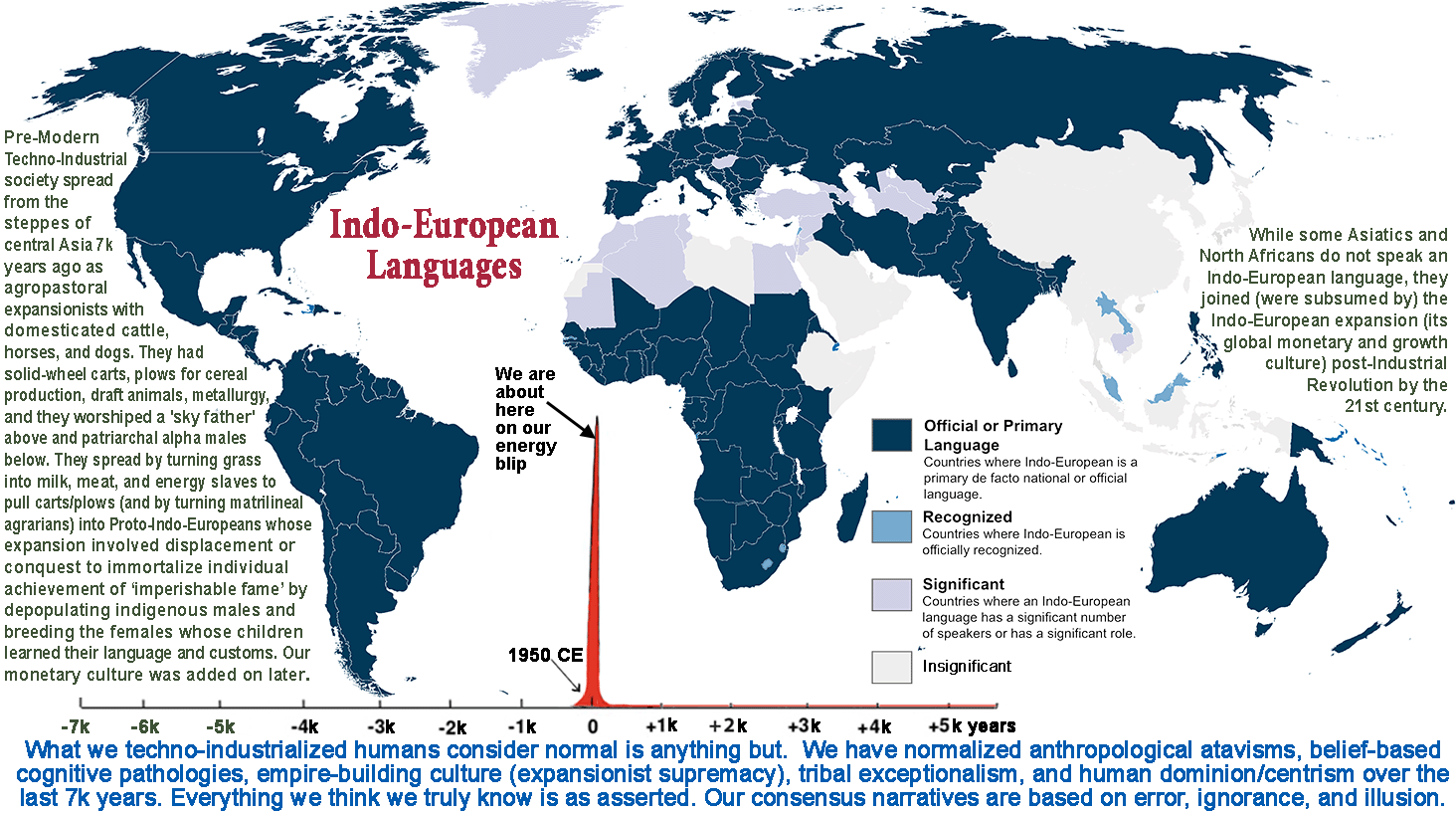
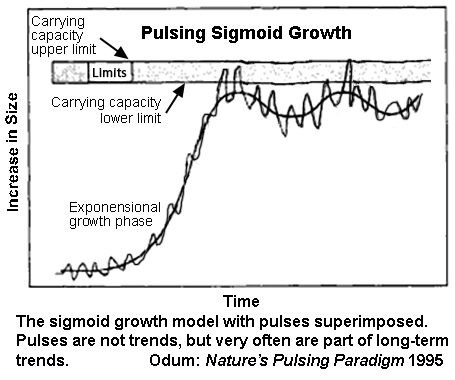 Arguably a better outcome would be for humans to renormalize as K-strategists able to understand and live properly (by helping to maximize the empower of the world system) with Mother. Doing so may require us to preserve information acquired on the upslope, the flower and fruit of our expansionist ways.
Arguably a better outcome would be for humans to renormalize as K-strategists able to understand and live properly (by helping to maximize the empower of the world system) with Mother. Doing so may require us to preserve information acquired on the upslope, the flower and fruit of our expansionist ways.
If humans come to prosper after a time on the downslope, they could resume and add to their love and understanding of the world system as the millennia pass. Perhaps humans will again send probes into interstellar space to explore the extended frontier. Perhaps humans become Earth Guardians and before life on Earth ends, a form of life we are ancestors to terraform an abiotic planet going around another star. Or perhaps posterity leaves a cairn on Moon with information that may be of interest to a passing alien, should one ever pass by.
Maybe we should consider questioning everything, rethinking everything, and even come to love and understand the planet enough to come to live with it properly (as Gaia alone determines). Should we listen to Nature just because she has all the answers? Or should we just keep on keeping on until we can't? I don't know. Complex systems are not only more complex than I know, they are more complex than I can know.
